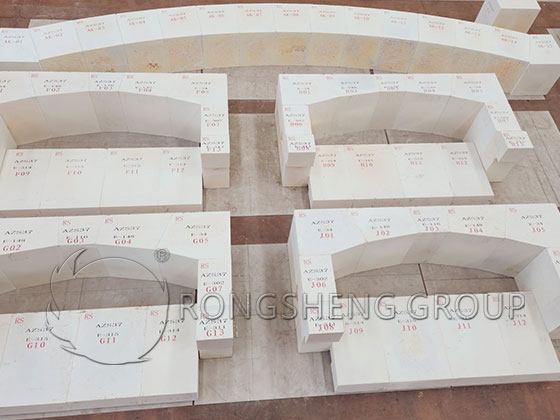The ignition and baking of the glass kiln are based on the physical and chemical properties of the refractory materials used in the kiln, that is the thermal expansion properties of the refractory materials. After heating and baking, the refractory material completes the internal crystal transformation and volume change, so that it can be used normally at high temperatures.
In the past, AZS bricks were expensive. Therefore, the kiln is not used or only used in small quantities in key parts. In the past two decades, with the development of high-efficiency and energy-saving kiln technology, AZS bricks have been widely used. AZS is increasingly used not only for the pool walls that are in contact with the glass liquid but also for the flame space. Due to the influence of traditional inertial thinking, most glass factories currently only consider the thermal expansion of silica bricks when baking kilns, but do not pay attention to the thermal expansion of AZS bricks. Therefore, fracture problems of AZS bricks often occur before and after the kiln is put into operation, which directly affects the life of the kiln.

Thermal Expansion Characteristics of AZS Bricks
AZS brick contains a certain amount of ZrO2, which is a homogeneous polycrystalline. That is, the same chemical composition can form three types of crystals with different structures and properties due to different temperature conditions. There are three types: monoclinic ZrO2, tetragonal ZrO2, and cubic ZrO2.
Changes in the crystal system are often accompanied by changes in volume. Taking 33# AZS as an example, it was found through experiments that when the temperature range is 0-1100°C, the bricks gradually expand as the temperature rises. When the temperature range is 1100-1200℃, the bricks shrink violently as the temperature rises. The linear expansion rate dropped from about 0.8% to about 0.6%, which is what is usually called abnormal expansion. This is caused by the transformation of the ZrO2 monoclinic system into the ZrO2 tetragonal system. When the temperature is higher than 1200°C, the bricks begin to expand again as the temperature rises.
It can be seen from laboratory testing data that the overall expansion is not large below about 1600°C.
Precautions when Baking the Glass Kiln
The kiln has a fire-amplification stage. The fire in the hot-air kiln is generally 900-1000℃. The practice has proved that most of the fractures of AZS bricks occur after a fire. The reason is that the temperature rise rate is too fast during the 1100-1200°C period when monoclinic ZrO2 transforms into tetragonal ZrO2. Therefore, it is generally required that the speed does not exceed 15°C/hour. Many manufacturers control it at 5°C/hour, and the speed does not exceed 15°C/hour in other temperature ranges. In this way, the AZS bricks have sufficient time to undergo crystal transformation and avoid fracture.
There is a temperature difference of several hundred degrees between the flame contact surface and the non-contact flame surface during the kiln baking process. In order for the outside of the brick to be able to undergo crystalline transformation safely, it is necessary to maintain a low heating rate within a larger temperature range. Therefore, the temperature range in the kiln is usually expanded from the theoretical 1100-1200℃ to about 1100-1350℃.
The upper 300-400 mm of the pool wall bricks are not insulated during normal production and need to be cooled. To reduce the temperature difference between the inside and outside of the kiln, insulation materials such as aluminum silicate fiber should be used for temporary insulation to prevent brick breakage. When the temperature reaches above 1500°C, the insulation fiber can be taken out.
When cooling the pool wall tiles, the cooling air inlet should be opened gradually. Generally, it is opened 5 times, and 20% is opened every hour.
The quality of the kiln’s work is related to the life of the kiln. Therefore, it is extremely important to correctly grasp the expansion performance of fused zirconium corundum bricks, standardize it in the kiln heating curve, and implement it carefully. Rongsheng refractory material manufacturer can provide a comprehensive range of lining bricks for glass kilns, including silica bricks, corundum bricks, corundum mullite bricks, AZS bricks, etc. Feel free to contact us for details.

